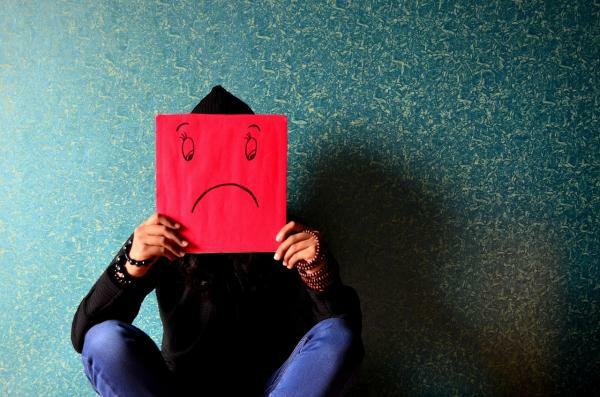
Do you know someone who plays the victim? Do you think you can be a person with a tendency to play the victim? Sometimes acquiring undesirable attitudes or surrounding ourselves with people who do can be very frustrating for our personal development and our emotional comfort. In this Psychology-Online article we explain what is being the victim and how do you get to this behaviorWe will see how to try to avoid it and be able to be a little more aware of ourselves.
Index
- What is playing the victim?
- Why do people like to play the victim?
- The reasons for victimhood
- Consequences of playing the victim in a relationship
- How to stop playing the victim?
What is playing the victim?
In the first place, defining this expression will help us to give a context on the subject. What exactly do we mean when we use the term “playing the victim”?
The meaning of victim according to the Royal Spanish Academy is "person who suffers damage through someone else's fault or fortuitous cause". Interestingly, the RAE also has a definition for the term
In these two definitions we can detect two extremes, the definition of the victim has a “culprit” outside the person, whereas in the second definition the complaint and the intention to attract attention in some way of others.
If we stay solely in the analysis of the expression, the sensation that it can produce is the intention of the person who "becomes the victim." This can lead to a rejection of this person or of ourselves when we detect that we have a victimizing behavior.
Why do people like to play the victim?
When we think of attitudes that we consider negative or unwanted, we have a hard time recognizing them in ourselves, since our brain is prepared to omit what it is not capable of sustaining. But the truth is that all of us, to a greater or lesser degree, have behaved in a victimizing way at some point in our lives.
We are used to reading these types of articles from a detached perspective of ourselves, that is, when we begin to read the attitude, behavior or characteristics of becoming the victim we think of someone we know or have around us, but we almost never do the exercise of a self-criticism. I invite you to try to reflect on the subject, trying identify a time where your behavior was similar or you think you could have this type of attitude, because from the humility of observing yourself you can acquire very valuable knowledge that will allow you to recognize attitudes that are impeding your development emotional.
One of the big mistakes we make when identifying a person with constant, passive complaining attitudes or victimizer is the idea that his behavior is a choice, that is, that he does it because he likes or wants. This is not the case, the behaviors or roles we play in our life are a consequence of our experiences, education, culture, disposition, self-knowledge and many other factors, therefore it is not a "choice". Therefore, it is not that we like to play the victim, but that it's the way we've learned to behave.
The reasons for victimhood.
When people act with a victimizing attitude, it is for the following reasons:
- Feeling helpless. Keep in mind that when we acquire a behavior from a victim perspective, it is because somehow we feel like this, that is, we feel helpless, vulnerable or overwhelmed by the situation or people that surround.
- Difficulty. To assume that something surpasses us is to assume our vulnerability and in many cases we do not have the emotional tools necessary to allow us to feel our fear or pain.
- Social pressure. In Western society we are educated with the belief of strength, the belief that we can achieve everything we set out to do and the idea of constant effort.
- Lack of emotional education. They do not teach us to live with the emotions that cause us displeasure or create anxiety, this makes We create models of avoidance in the face of situations that we do not know how to face and the terror that it causes us "fail". When we have knowledge and respect for our emotions and how they act in the face of the circumstances that surround us, for example, the fact of "failing" is not taken as a defeat, but as an apprenticeship, acquiring knowledge of the environment and our limitations, allowing us to try again what we had proposed.
- Unsafety. On the other hand, from the insecurity and the little connection with our emotions a “failure” would have no place, since it would be necessary to assume that “we could not”, this for a person with low emotional knowledge or who tends to play the victim would be untenable and would choose to blame someone, avoiding responsibility for their limitations. In the following article you will find how to overcome personal and emotional insecurity.
Consequences of playing the victim in a relationship.
If you think you are in a relationship with someone who uses the attitude of playing the victim, keep the latter in mind, possibly not even aware that it does. Trying to reflect to a person their victimizing attitude can be a bad idea, since the person who has acquired that role does not she will have the ability to identify him and blame you, projecting negative feelings from him and feeling that it is you who wants harm you.
On the other hand, it is healthy to see what kind of relationship you have with that person, sometimes, the behavior of one is fostered by the behavior of the other. That is, you may ask yourself, in what way do I encourage this victimizing behavior?
At times, one can assume the protector role causing the other person with a tendency to avoid responsibility to assume more and more the victim's behavior.
If you take on the role of protector, caring too much for someone, trying to solve their problems, crossing the line of individuality, it is positive that you begin to take responsibility for yourself and learn to detach yourself from those attitudes, leaving room for the other person to learn to take responsibility of his own circumstances, thus being more free and autonomous in his life, in this way you will be promoting the growth of that person at the same time as your own.
If, on the other hand, you believe that your behavior is that of a victim, it is convenient that you ask yourself the same question: how do I promote protective behavior? Detect the behaviors that you have acquired within the relationship, why are you looking for someone to protect you or solve your problems or emotional voids, it will help you to start to be self-sufficient and responsible for your attitudes.
It must be taken into account that any relationship that is built from necessity, whatever the type, is not a healthy relationship, since it is always there will be one of the parties that has power over the other, and may even change roles since the habit of “giving and receive". A healthy relationship is not based on what we get out of it., but in who we are and how we share who we are with the other.
How to stop playing the victim?
Presumably, as in everything, there are different levels of victimizing behavior. If you have been able to make a self-criticism and have detected a moment in which you have behaved from a victim position, let's see how to change the victimizing attitude:
1. Analyze yourself
Try to see why you have behaved from a victim position, do not put the responsibility on the other, ask yourself:
- Why did I act submissive?
- Why didn't I take responsibility?
- What was I afraid of?
- What was he trying to avoid?
With these simple questions you can begin to investigate yourself, beginning to take responsibility for your behavior.
2. Analyze the environment
In some cases, behavior is influenced by the environment, as we explained before, one trend can be influenced by another, if you realize that you are in a environment of over protection or excessive controlIt is healthy that you give yourself a space, allowing you to observe your behavior outside of this environment and detect if there are changes in your attitude.
3. Take responsibility
Sometimes we want to know where our attitudes come from and we focus on finding answers, passive attitudes and feelings of victim are usually caused by overprotection or experiences where we feel defenseless in the early stages of our growth. But the truth is that discovering the origin is not synonymous with healing, it actually becomes an escape from taking responsibility for the present behavior.
4. Empower yourself
Any behavior that we use in the present, even if it originates from the past, only se can solve in the present. Raising awareness, realizing how we bond, what we look for in others, what we avoid and what attitude we have in front of adversity, with all this information and little by little we can acquire responsibility and empower ourselves as free people.
5. Ask for professional help
If you think that you are not capable of doing this process autonomously or you feel that you do not have any type responsibility for what happens in your life, it is recommended that you go to a professional, start a emotional growth therapy it can help you gain knowledge and power to manage your life from who you are, respecting yourself and building healthy bonds.
6. know yourself
The only way to change any kind of attitude that we are not satisfied with is knowledge, asking ourselves questions such as:
- Who I am?
- What do I like about myself?
- That I do not like it?
- What would I like to improve?
Seek answers to these questions through readings, talks with people from our environment or from different environments, therapy or any activity that helps you get to know yourself a little more.
This article is merely informative, in Psychology-Online we do not have the power to make a diagnosis or recommend a treatment. We invite you to go to a psychologist to treat your particular case.
If you want to read more articles similar to Playing the victim: why and how to stop doing it?, we recommend that you enter our category of Personal growth and self-help.
Bibliography
- Fromm, E. (2004). the fear to the freedom. Barcelona: Paidós.
- Fromm, E. (2017) To have or to be. Barcelona: Paidós.
- Goleman, D. (1996) Emotional Intelligence. Barcelona: Kairos.
- Pradervand, P. (2007) Victim or responsible? I decide. Barcelona: Sal Terrae.


